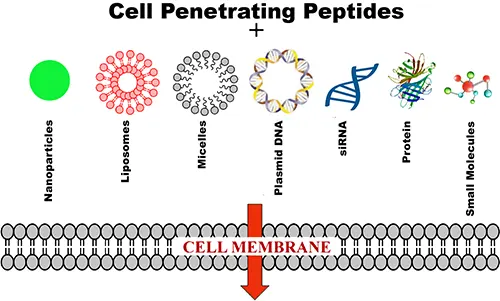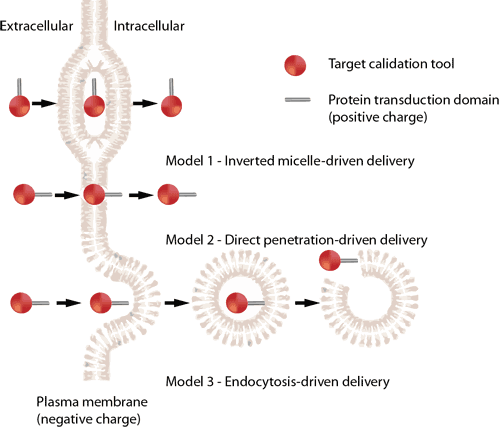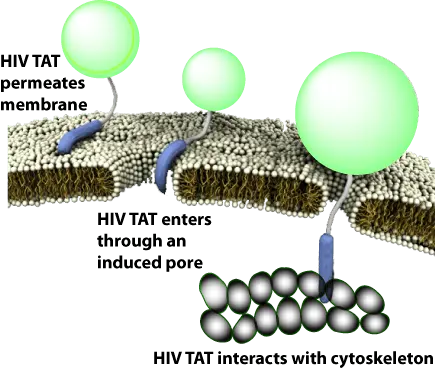Please click here to get a quote for CPP service now!

How to Design Cell Penetrating Peptides?
Click here to browse full transcripts of "Cell-Penetrating Peptides: Design, Synthesis, and Applications."
Read more: A full list of cell penetration peptides.
Download the full list HERE!
We have a selection of in-stock Cell Permeable Peptides (CPPs) readily available for conjugation with your target molecules, whether they are peptides, proteins, fluorescent dyes, or nanoparticles. Click for a list of in-stock Cell Permeable Peptides. Your peptide will be conjugated to the Cys(Npys)-(Arg)9. This peptide is synthesized with an activated cysteine residue C(Npys), utilizing the 3-nitro-2-pyridinesulfenyl (Npys) as a selective protecting group that can be activated for peptide bond formation.
The S(Npys) group within this cysteine-containing R9 peptide selectively reacts with the free thiol group of your cysteine-containing peptide, forming an unsymmetrical disulfide bond. This conjugate is designed to efficiently deliver the target peptide into cells and subsequently release therapeutics such as siRNA or your desired peptide in the reducing cellular environment, thereby rendering your peptide cell-permeable.
Ask a quote to make your peptide cell permeable now!
The challenge of introducing drugs into cells has long confounded scientists. However, cell-permeable peptides (CPPs) possess a unique ability to traverse the plasma membrane of a cell independently of a membrane receptor. These CPPs are typically short peptides, ranging from 10 to 30 residues in length, often characterized by positively charged amino acid sequences.
CPPs are adept at delivering biologically active cargo to the interior of cells. By attaching the desired therapeutic cargo to a CPP, one can overcome the barriers imposed by the plasma membrane and efficiently target intracellular destinations.
CPPs have garnered widespread attention as promising non-viral vectors for transmembrane delivery. Although they have successfully transported a variety of cargoes, including plasmid DNA, peptides, proteins, nanoparticles, and quantum dots, among others, their most rapid progress has been in the delivery of oligonucleotides (ONs). Notably, the cardiac targeting peptide (CTP) has demonstrated specificity in transducing cardiomyocytes. An example of a myocardial cell-specific protein transduction domain (PTD) is APWHLSSQYSRT.
The success of CPP-based cellular delivery vectors hinges on careful tuning of the peptide sequence to match the cargo and application.For instance, a stearylated poly-arginine peptide, Stearyl-R8: st-RRRRRRRR-NH2, proved effective with larger plasmids. In contrast, larger plasmids were ineffective for the cellular delivery of splice-correcting oligonucleotides.

Method for simple mixing:
For instance, to achieve MPG-mediated gene delivery, complexes of the peptide carrier and DNA were prepared by mixing 500 ml of either DMEM with 100 ng of DNA complexed with MPG at a charge ratio of 5:1. After incubating the samples at 37°C for 30 minutes, they were added to cells at 60% confluence.
For further insights into various peptide-mediated delivery systems, we recommend referring to this review paper from Nature.
Numerous novel CPPs have effectively transfected a wide range of cell types, eliciting specific biological responses without exerting cytotoxic effects. Additionally, CPP-mediated Oligonucleotides have demonstrated their potential to effectively inhibit tumor growth in tumor-bearing mice in vivo, without triggering an immune response. CPP–Oligonucleotides complexes hold significant therapeutic promise.
Table: Application and effects of CPP-mediated siRNA delivery using noncovalent strategies
CPP |
Cells/Model |
Effect |
Reference |
HIV TAT The cysteamide stabilises the DNA-carrier complexes. |
HeLa and Cos-7 |
Cellular uptake of single- and double-stranded ONs 50 nmol/l siRNA→85% and 78% luciferase downregulation |
Simeoni et al. |
Cys(Npys)-(Arg)9: C(Npys)RRRRRRRRR - NH2 Order this cell permeable peptide now! It can selectively react with the free thiol group of your cysteine-containing peptide.Stearyl-R8 Stearyl-R8; FITC-Stearyl-R8; RRRRRRRRRC; C(Npys)RRRRRRRRR; Polyarginine peptides have been efficiently used for siRNA delivery into cells. Stearyl-R8 can lead nucleic acids through cell membranes. There is no need of covalently attachment between the nucleic acid and the multiple arginine peptide. |
EGFP-expressing |
16 nmol/l siRNA→>50% reduction in EGFP activity | Tönges et al. |
Antennapedia
|
Drosophila Antennapedia DNA binding domain |
Christiaens B. et al. |
|
Penetratin - Arg RQIRIWFQNRRMRWRR; C-RQIRIWFQNRRMRWRR; {FITC-LC}-RQIKIWFQNRRMKWKK; {5-FAM}-RQIKIWFQNRRMKWKK; |
The third helix of Drosophila Antennapedia homeodomain protein |
J Am Chem Soc 132 (3), 1-21 (2010) | Ye, J. et al. |
There are three proposed routes of CPP entry:

Arginine- or lysine-rich CPPs have found widespread use in gene targeting. Stearyl-RRRRRRRR-amide can be spaced using aminohexanoyl (Ahx) to enhance hydrophobicity and proteolytic resistance in serum. Incorporating a fatty acid into arginine-rich peptides enhances the delivery of the peptide nucleic acid conjugate.
Click this review paper from Nature to learn more about the strategies for peptide-mediated delivery.
Since the discovery of Tat, GRKKRRQRRRPQ, the number of known peptides with cell-permeable capabilities has grown. The following table provides examples of currently known CPPs, along with their origins and sequences.
Some CPPs are hydrophilic, containing arginine and lysine, such as penetratin and TAT (GRKKRRQRRRPQ). Others are amphiphilic, characterized by a high lysine content. A classic example is the beta-amyloid protein, which forms antiparallel beta sheets with strong amphiphilic properties, aggregating into toxic oxidative fibrils.
Name |
Origin |
Sequence |
Tat (48-60) |
HIV-1 protein |
GRKKRRQRRRPPQQ or GRKKRRQRRRPQ |
Cys(Npys)-(Arg)9 |
Tat derivative |
|
Oligoarginine |
Tat derivative |
Rn |
Transportan |
Galanin-mastoparan |
GWTLNSAGYLLGKINLKALAALAKKIL |
P-beta MPG peptides |
gp41-SV40 |
GALFLGFLGAAGSTMGAWSQPKKKRKV |
Pep-1 |
Trp-rich motif-SV40 |
KETWWETWWTEWSQPKKKRRV |
STR-R8 |
Tat derivative |
Stearly-RRRRRRRR-amide |
CPPs, including HIV TAT peptides, can access cells through internalization pathways such as direct translocation and endocytosis. HIV TAT peptide or poly-arginine-containing peptides can be designed and employed in drug delivery systems. However, it remains unclear how CPPs achieve efficient cellular molecular transportation.
How does HIV TAT peptide facilitate direct translocation and endocytosis? Experiments conducted in Gerard Wong's laboratory have demonstrated that HIV TAT peptides can interact with various intracellular components, including the cell membrane, cell surface receptors, and the actin cytoskeleton. These interactions lead to different translocation pathways under varying conditions.

Interestingly, the same sequence within the TAT peptide can interact with different cellular components, such as the plasma membrane or the actin cytoskeleton, triggering distinct translocation pathways under a variety of conditions.
The entry mechanisms of cell-permeable peptides depend on their amino acid sequence. The addition of a single hydrophobic amino acid to a highly hydrophilic cell-permeable peptide sequence can significantly alter the penetration mechanism. For instance, polyarginine RRRRRRRR can induce the formation of a cell membrane pore, as arginine creates both positive and negative curvatures. In contrast, lysine generates only negative curvature in a single direction. Therefore, peptides containing arginine residues and lysine or hydrophobic amino acids may function differently.
Notably, TAT peptide can mediate endocytosis with or without receptors. CPPs utilize less hydrophobic amino acids to induce curvature in the membrane, with high hydrophobicity generating negative Gaussian curvature.
Download the full list HERE!
Quotations